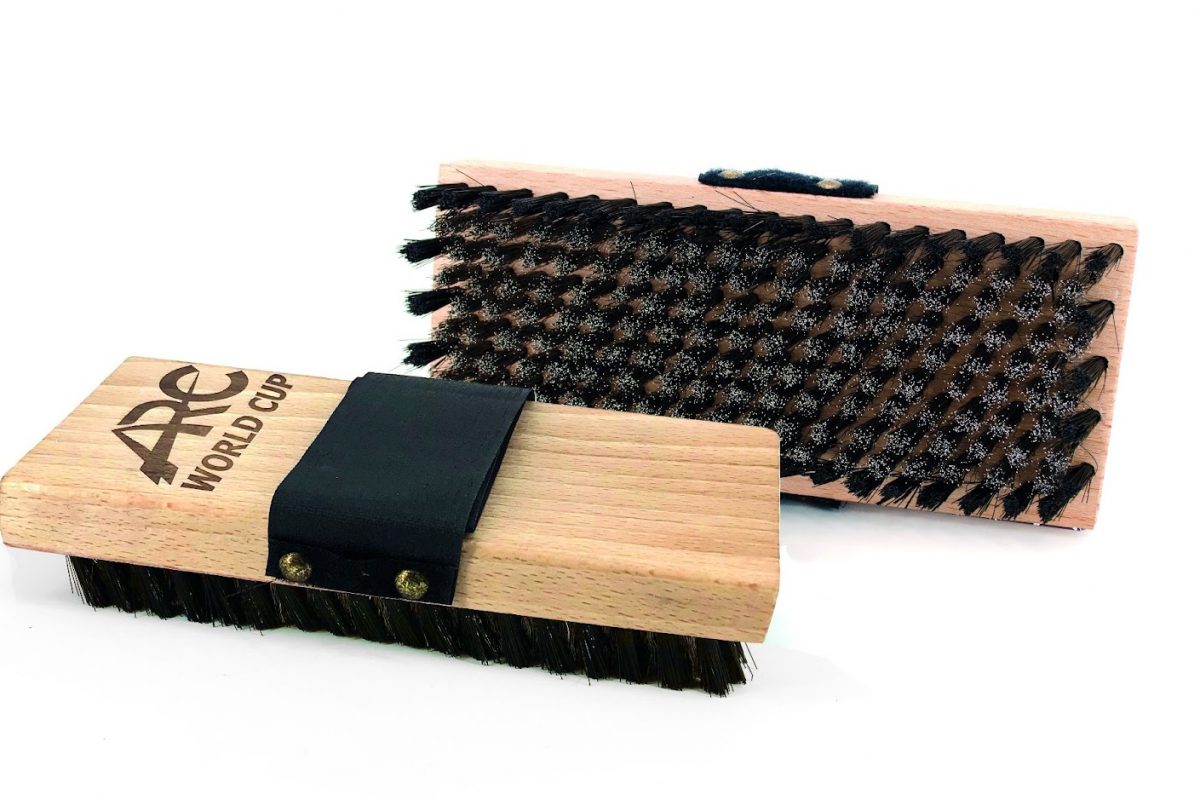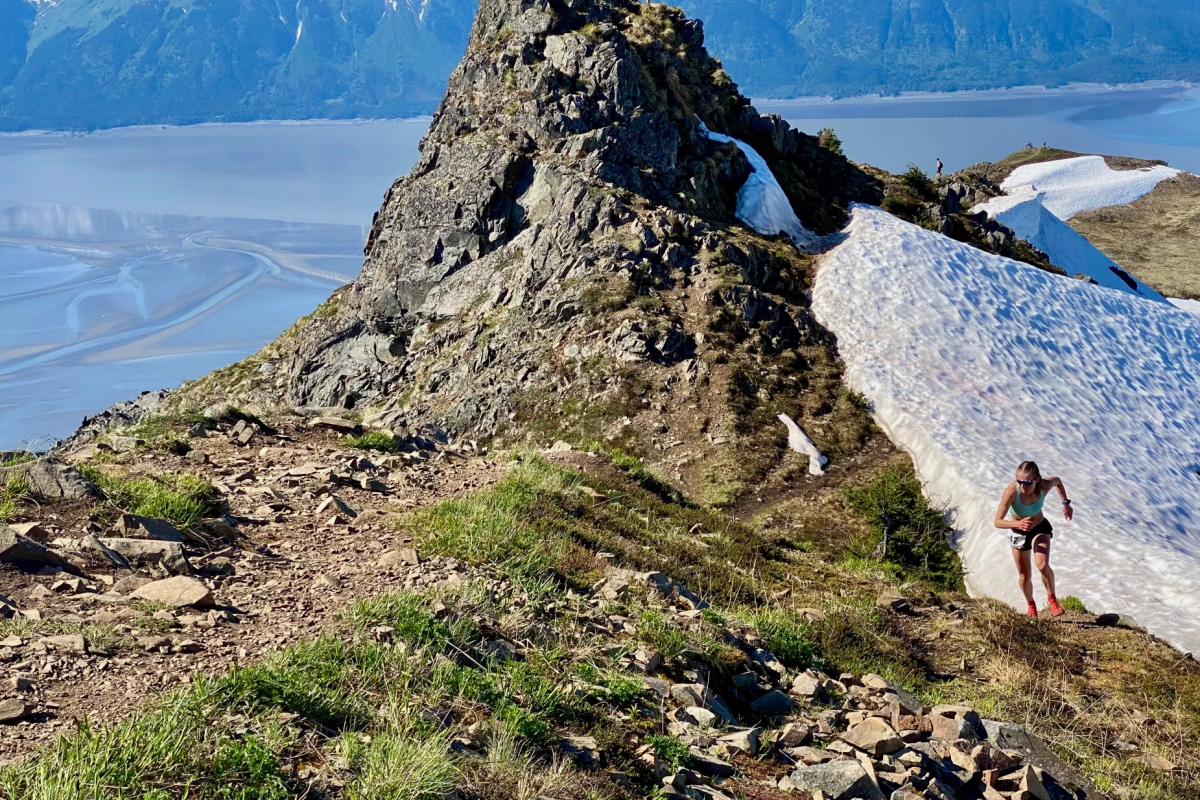 This coverage is made possible through the generous support of Marty and Kathy Hall and A Hall Mark of Excellence Award. Learn more about A Hall Mark of Excellence Award—or about supporting FasterSkier coverage—by contacting info@fasterskier.com.
This coverage is made possible through the generous support of Marty and Kathy Hall and A Hall Mark of Excellence Award. Learn more about A Hall Mark of Excellence Award—or about supporting FasterSkier coverage—by contacting info@fasterskier.com.
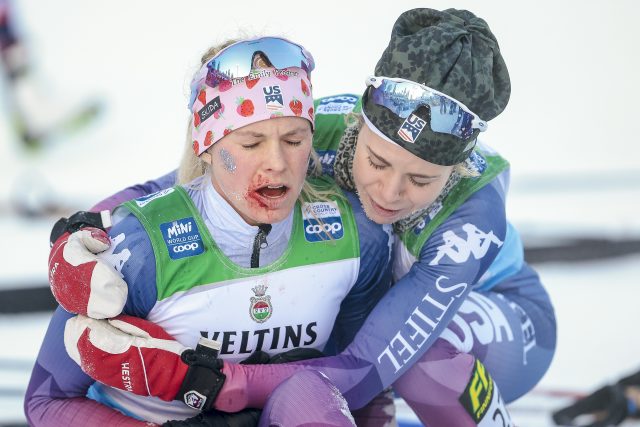
It was an epic day of racing in Ruka, Finland where the women closed out their racing with the 20 kilometer mass start freestyle. The American squad was hoping that Jessie Diggins could repeat the magic she displayed in Davos, Switzerland last year where she won the only women’s 20 kilometer freestyle mass start event of the year and went on to finish second in the distance crystal globe competition. Rosie Brennan (USA) finished third that day. Today the question surrounding Brennan was whether she could sustain her energy after her emotional podium finish yesterday. Sweden was hoping its star-studded team could dominate as they did at times last year. Finland was counting on the home field advantage propeling Kerttu Niskanen, last year’s distance cup winner, to the front. But none of the pre-race prognostications could prepare fans for what they were about to witness.
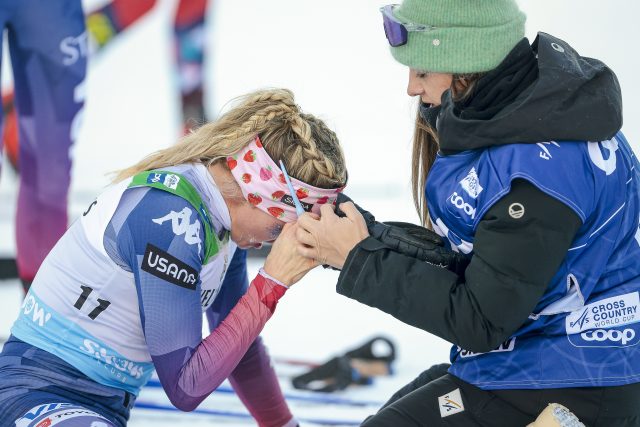
As the weekend concluded, it was Sweden that came out on top with Moa Ilar narrowly taking a dramatic, pulse-quickening victory over Jessie Diggins who finished second and Rosie Brennan who came in third.
In addition to Diggins and Brennan, four other Americans achieved impressive results: Sophia Laukli finished 14th, Novie McCabe 21st, Julia Kern 26th, and Alayna Sonnesyn 34th.
The top Canadian finisher was Katherine Stewart-Jones in 22nd ,while her teammate, Amelia Wells, finished 44th.
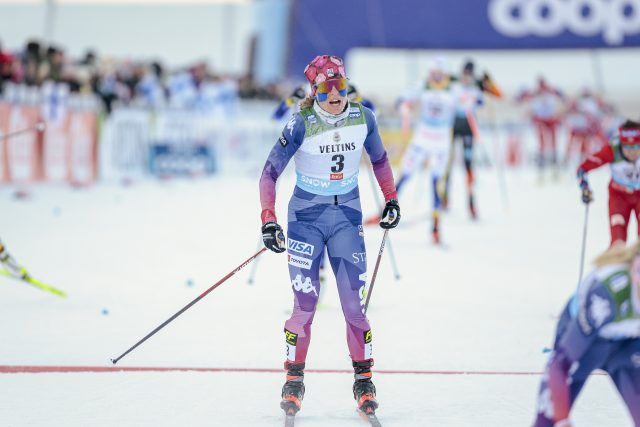
High Drama in the 20 Kilometer Mass Start Freestyle
Ski fans were treated to a thrilling race today with back and forth competition punctuated by a finish with high drama. It was a cold day in Ruka, six degrees Fahrenheit, with many of the racers wearing face tape and most wearing extra head and neck coverings. Skiers navigated eight laps of a 2.5 kilometer course, reaching top speeds over 46 mph (75 kmh) on the loop’s steep downhill.
For the first five kilometers, the pack maintained a casual pace resulting in a large group at the front. It was at that point when Diggins had enough of the slow pace and pushed to the front to set a faster tempo. It was a move that began to splinter the field. Coach Matt Whitcomb confirmed that the move was “intended to shed a few people off the pack, you don’t want to have 15-20 people in the finishing sprint because in that group there’s someone there that’s likely to out sprint you.”
The turn of pace presented early concerns about Brennan. At this point she dropped back to 20th, thirteen seconds off the lead, and it looked as though yesterday’s effort may have taken its toll on her.
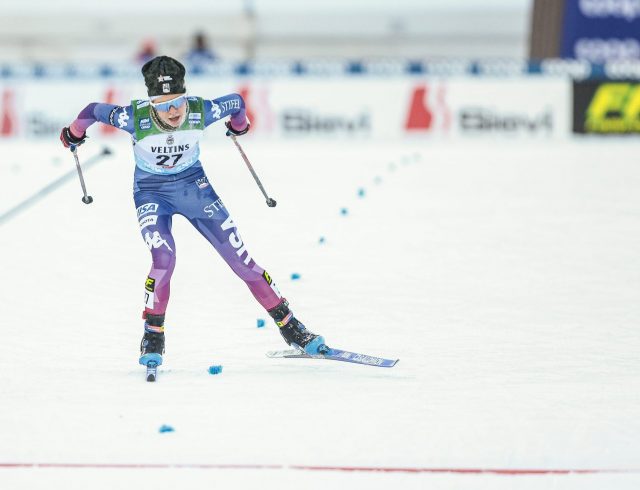
At the ten kilometer mark, a 20-skier lead pack established itself. Near the back of that pack (in 13th) was long-distance standout and trail running champion Sophia Laukli (USA). For Laukli, the longer the distance the better. She had told FasterSkier earlier in the year that she considers anything under five kilometers as too short for her liking.
At 12 kilometers, Margrethe Bergane (NOR) forced the pace with Diggins and Ebba Andersson (SWE) joining her at the front. Bergane pulled with her a large group of her teammates with the venerable Heidi Weng and long distance specialist Astrid Oyre Slind joining the Norwegian cluster. At this point, Brennan and Laukli were still hanging at the back of the pack while Norway appeared to be making a concerted effort to control the pace.
At 14 kilometers, Bergane made her move accompanied by Andersson and Frida Karlsson (SWE). They established a gap on the field which Diggins was able to bridge by doing what she does best: using the next downhill to narrow a gap. A large group clung to her, and the pack reconsolidated into a group of 14 with Laukli at the rear. Brennan had worked to erase her early deficit and she was now only five seconds off the lead. Concerns about the effects of yesterday’s racing were shaken off as Brennan was now firmly in contention.
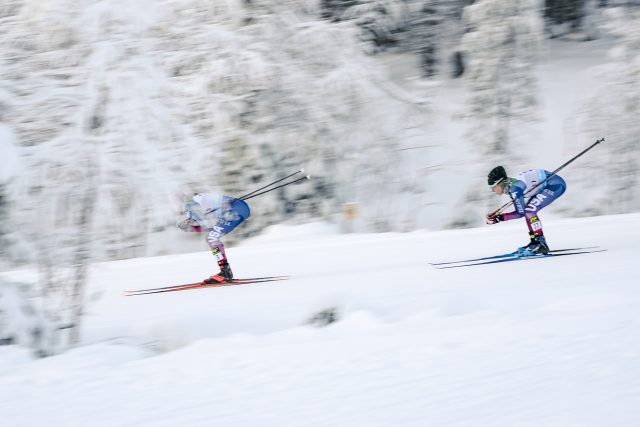
At 17.5 kilometers, Brennan surged toward the front of the lead pack having clearly regained her footing. With 2.5 kilometers to go, the pace slowed a bit; the lead pack reconsolidated again with Brennan and Diggins toward the front and Laukli at the back, but only five seconds from the front.
It was then that fate intervened, adding a signature moment to the already moment-filled career of Jessie Diggins. Diggins and Brennan were toward the front, but the pack remained tightly clustered when, suddenly, Diggins had a pole yanked from her hand; it appeared that her pole had been stepped on; the force of the tug so strong that it ripped her glove off along with the pole. The reason mattered less; the damage had been done. Without a pole—and gloveless in Ruka’s bitter cold—Diggins dropped to the middle of the pack with very little time left in the race.
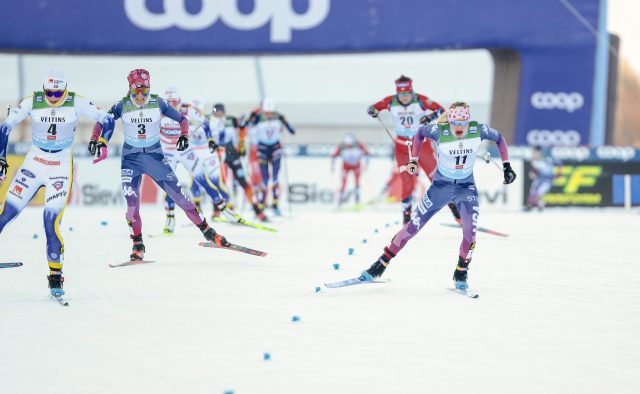
The damage pushed Diggins into eighth. Fortunately, the American staff was present at the side of the course where they were immediately able to hand her a replacement—though in that exchange Diggins suffered a blow to the face that left her bleeding. Bare handed, she surged on the final climb and shot back to the front using a furious climbing pace. Throughout the drama, Brennan hung with the race leader, Moa Ilar (SWE), who had moved up from fourth place. In an incredible three-way fight for the finish, Ilar found another gear and was narrowly in front of Diggins at the top of the final hill. At the crest, all three racers jumped into sprint mode with Ilar having just enough to edge out Diggins by three tenths of a second. Brennan was in the mix the whole time and finished third, a mere 1.4 seconds out of first.
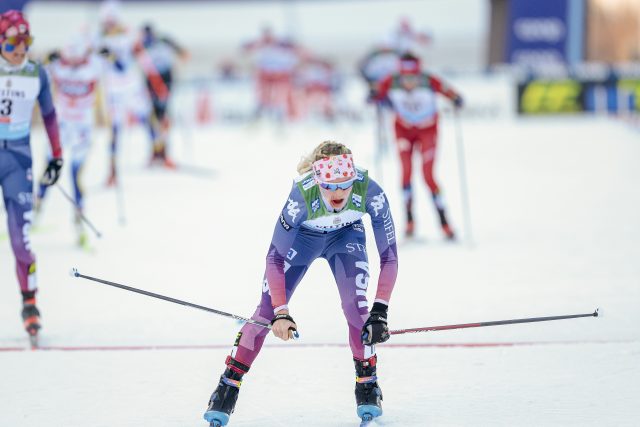
But for a cruel twist of fate, who knows how the race might have played out? At the finish, Diggins was bloodied; her bare hand trembling. She was helped out of the finish area by American staff members. The last 1.6 kilometers of the race would become an instant Diggins-classic in a career already defined by gutsy performances. It would also establish Brennan as a force to be reckoned with on any given World Cup race course. It was a day of heroics and pride for team USA as they overcame adversity and fought off the major Nordic powers to claim two-thirds of the podium.
After the race Diggins said that she was fine. “I’m doing okay, It was a little bit rugged at the finish and I just want to say a huge thank to our team and the FIS (International Ski Federation) team-they took really good care of me.”
Diggins injury was a minor bloody lip that came from the pole exchange. According to Whitcomb, the quick exchange was the result of coach Kristen Bourne’s prescient actions. “The same thing happened to Jessie between five ten years ago in the exact same spot,” Whitcomb said. “[Diggins] has fairly narrow hands, so when someone steps on the pole, the strap and glove all come off her hands. Thirty seconds before that happened, Kristen Bourne, said ‘I’m going over to this hill because I have a feeling things are about to get crazy.’ Thank goodness she did, because she saved us a podium.” Whitcomb added that there was a second pole exchange several hundred meters later to provide Diggins with a better fitting pole. Diggins was hit in the face by the pole handle as it was being given to her. It was on the first pole exchange that the injury occurred. Whitcomb confirmed that Diggins is “fine.”
Diggins also confirmed that it was the pole exchange that did the damage. “I got a replacement pole, got a pole smash to the face and apparently got a pretty bloody mouth,” she said. “I’m proud of myself for just never giving up, digging deep. It was so special to share that podium with Rosie, and Sophia had a great race too.” Diggins also had praise for the support staff. “Our techs have been working so, so hard, and I’m very thankful to them…you don’t get podium finishes or good races without the whole team supporting you.”
“You really can’t ever count out Rosie Brennan. She is as tough as they come.” USA Coach, Matt Whitcomb
Whitcomb also had high praise for Rosie Brennan. “It certainly looked like she was beginning to dangle and that stretched out string was about to snap,” he said. “[But] you really can’t ever count out Rosie Brennan; she is as tough as they come. If you want to count her out you had better put 15-20 seconds into her. When it came down to see who was the toughest, Jessie and Rosie were among the top three.”
After the race, Brennan acknowledged that she struggled at times. “Maybe it was from yesterday, maybe it was just not finding my groove…who knows. In the middle of the race I was definitely doubting myself and not feeling great. I just [was] trying to remember that 20 k is long enough to be patient, and this course can also suit those that are patient…So I just tried to keep that in mind. I’m proud of using some experience—and my brain a little bit—to get me around the course the best way possible.”
Whitcomb also had praise for Laukli’s performance. “She was very excited with today’s race,” Whitcomb said. “With the pace being mellow at the start she was able to move to the front and push the pace.”
Whitcomb had kudos for the entire team’s performance including coaches, techs, and cooks. “I’d love to give a shout out to all of my staff. We had two P.T.s running the athletes spare poles, and warm ups. We had a press officer handling a pole position, and our chef was even out there literally banging pots and pans to celebrate every time racers skied by. My phone has been blowing up. Thank you to everyone back home, I’m seeing lot of donations come in for our Drive for 25 fund raiser.”
By the time the flower ceremony began, Diggins was all smiles, showing no obvious effects from her dramatic final kilometer of racing. It was a day that will go down as an epic performance by a gutsy American squad.
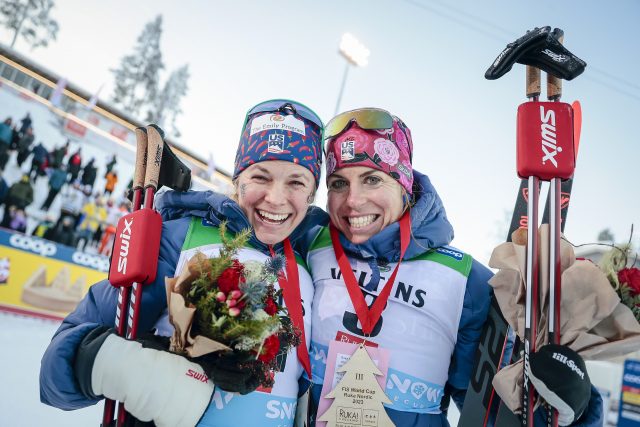
Women’s 20 k Freestyle Mass Start RESULTS

